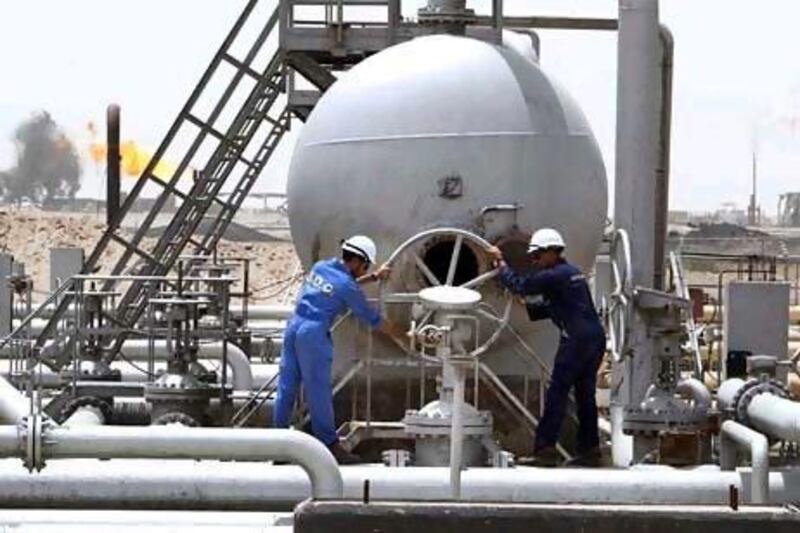Royal Dutch Shell is in talks with Iraq to cut its output target for the giant Majnoon oilfield, a move that could prompt other companies to seek similar revisions.
The European oil major won the rights to develop the giant oilfield in 2009, and is contractually obliged to increase production to 1.8 million barrels per day (bpd). But in a meeting held with government officials last month, the company proposed to cut the target to 1 million bpd, reduce spending, and extend the period under which peak production will be sustained, documents seen by Reuters show.
"Shell proposed to extend Majnoon's plateau time to more than 20 years from seven years and to cut required total development costs by US$10 billion [Dh36.73bn]," a document from the oil ministry reads.
The talks could prompt other international oil companies in Iraq to seek changes to their service contracts, which stipulate an overall production capacity increase to 12 million bpd by 2017, versus 3 million today.
This target would make Iraq the second-largest oil producer in the world, but it has been proved unrealistic because of export bottlenecks and a precarious security situation.
The government is now believed to be targeting a capacity of 8 million bpd in five years, but some experts believe even that to be unfeasibly high.
Given the huge investment needed to add to capacity, analysts say Baghdad may be willing to agree to Shell's proposal, and allow other companies to follow suit.
"Iraq will have no option but to be realistic. Increases should go in line with world demand," said Luay Al Khatteeb, the executive director at the Iraq Energy Institute. "You don't want to overproduce fields and depress prices while depleting the reservoirs in a manner that could damage reserves."
Shell has spent about $1bn since taking over Majnoon in 2010, while total spending over the life of the 20-year project was originally estimated to be about $50bn.
The country is targeting production of 3.4 million bpd this year and more than 4 million barrels next year, according to Asim Jihad, a spokesman for the oil ministry in Baghdad.
Bottlenecks for shipments from southern Iraq, where energy companies are making most of their investments, have eased with the construction of two offshore mooring facilities for supertankers.
Another two units will be built in the coming months. The country aims to generate $100bn from oil sales this year, according to Abdul Kareem Al Luaibi, the Iraqi oil minister.
Iraq still faces hurdles to its re-emergence as a reliable global supplier. As the United States withdrew the last of its troops from the country in December, the government reinforced security at energy installations, and attacks have decreased in frequency and intensity.
Although the new mooring facilities helped to boost output from Basra by 200,000 bpd last month, they are operating below capacity.
Politicians are at loggerheads over sharing oil revenue with the semi-autonomous Kurdish region, a dispute that threatens projects of ExxonMobil and other foreign investors. Even with the Kurds halting shipments of crude on April 1 through a pipeline controlled by the central government, progress in rebuilding infrastructure has allowed Iraq to raise production by 45 per cent since the end of 2003.
The government has estimated it will need to invest about $180bn to support its original output targets.
Growth in demand for oil, which is forecast to reach 110 million bpd by 2035 from 90 million today, might make Iraq's ambitions justified over the long term. "The world will need two Saudi Arabias to meet markets," Mr Al Khatteeb said.
* with agencies
twitter: Follow and share our breaking business news. Follow us
iPad users can follow our twitterfeed via Flipboard - just search for Ind_Insights on the app.





